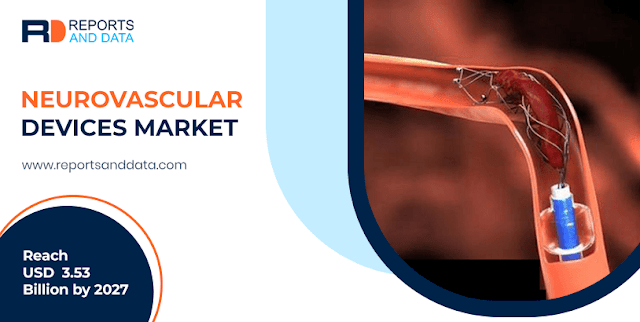Neurovascular disorders are the second most leading causes of death worldwide after heart diseases. Statistical data suggest a high number of people are at an increased risk of developing neurological disorders due to the increasing incidences of lifestyle disorders and aging-related physiological problems in the geriatric populations. The increasing investments and expenditure on neurovascular therapy research and increasing awareness about minimally invasive procedures are boosting the demand for neurovascular devices. Neurovascular devices are based on numerous mechanisms of actions. Neurovascular devices used extensively include embolic coils, flow diversion devices, catheters, arterial stents, guidewires, liquid embolic agents, and others. These devices are often used to treat complex neurovascular disorders and to enhance patient outcomes.
The
growth of the neurovascular devices market is majorly driven by the rising
number of neurovascular surgeries, the increasing need for minimally invasive
procedures, advancements in healthcare infrastructure, and the availability of favorable
reimbursement policies. Moreover, the increasing incidences of traumatic brain
injury, cerebral aneurysm, and brain stroke are expected to fuel the growth of
the market over the coming years. The rising prevalence of the above-mentioned
conditions is expected to add traction to the expansion of cerebral
embolization and aneurysm coiling devices segment. The advent of advanced
therapeutic and diagnostic technology and the benefits and safety offered by
microcatheter and microguide wires are further propelling the adoption and
growth of the neurovascular devices market. The high prevalence of
hypertension, smoking, and increasing initiatives by the government and
healthcare facilities to raise awareness is further anticipated to boost the
market growth.
Some of the key players operating in the market are W. L. Gore & Associates, Inc., Abbott Laboratories, Terumo Corp., Merit Medical Systems, Inc., Penumbra, Inc., Medtronic Plc, Stryker Corp., MicroPort Scientific Corp., Johnson & Johnson, and others. The prominent players of the industry are focusing on the design and development of innovative neurovascular devices and strategic alliances to gain a substantial footing in the market. In 2019, Medtronic launched ai8 Phenom 21 Catheter, a neurovascular device that dissolves blood clots from the obstructed vessels of the brain to restore the normal circulation of blood in patients with large vessel occlusion. In September 2020, Johnson & Johnson Medical Devices Company’s subsidiary, CERENOVUS launched CERENOVUS Stroke Solutions™ consisting of 3 devices designed to assist the doctors during clot removal procedures.
In
July 2020, medical imaging AI specialist, Avicenna, received a clearance from
the U.S. FDA for its CINA Head Triage AI solution for neurovascular
emergencies. The approval covers the capability of CINA to automatically detect
large vessel occlusion and intracranial hemorrhage from images of CT scans.
Read full press release at: https://www.reportsanddata.com/press-release/global-neurovascular-devices-market




